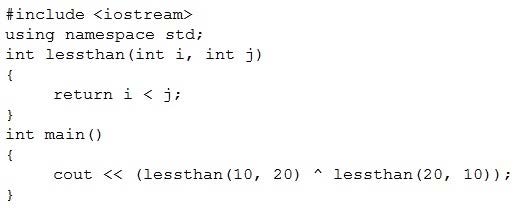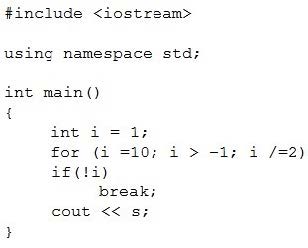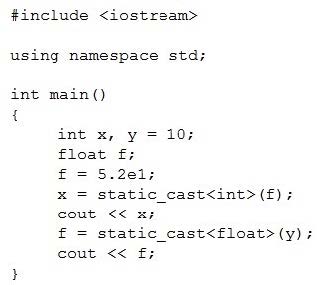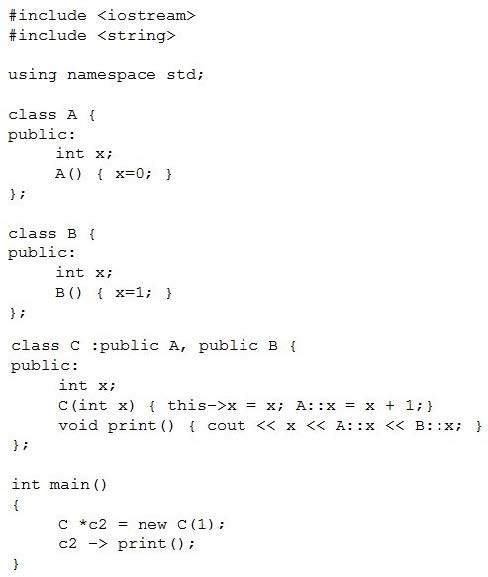Exam Details
Exam Code
:CPA-21-02Exam Name
:CPA - C++ Certified Associate ProgrammerCertification
:C++ Institute CertificationsVendor
:C++ InstituteTotal Questions
:257 Q&AsLast Updated
:Jul 18, 2025
C++ Institute C++ Institute Certifications CPA-21-02 Questions & Answers
-
Question 121:
Which code, inserted at line 10, generate the output "50"?
#include
using namespace std;
class Base {
int age;
public:
Base () {
age=5;
};
//insert code here
void Print() { cout << age;}
};
void setAge(Base andob) {ob.age = 0;}
int main () {
Base a;
a.Print();
setAge(a);
a.Print();
return 0;
}
A. friend void setAge(Base ob);
B. friend void setAge(Base *ob);
C. friend void setAge(Base andob);
D. None of these
-
Question 122:
What happens when you attempt to compile and run the following code?
#include
using namespace std;
void fun(char*);
int main()
{
char t[4]={'0', '1', '2', '3'};
fun(andt[0]);
return 0;
}
void fun(char *a) {
cout << *a;
}
A. It prints: 01
B. It prints: 1
C. It prints: 0
D. It prints: 0123
-
Question 123:
What happens when you attempt to compile and run the following code?

A. It prints: 1
B. It causes a compilation error
C. It prints: -1
D. It prints: 0
-
Question 124:
What is the output of the program?
#include
using namespace std;
class BaseC
{
int i;
public:
BaseC() { i=?1;}
BaseC(int i) { i=i; }
void seti(int a) { i = a; };
void Print() { cout << i; }
};
int main()
{
BaseC *o = new BaseC();
o?>seti(10);
o?>Print();
}
A. It prints: 10
B. It prints: ?1
C. It prints: 0
D. Compilation error
-
Question 125:
What happens when you attempt to compile and run the following code?

A. It prints: 1
B. It causes a compilation error
C. It prints: -1
D. It prints: 0
-
Question 126:
What happens when you attempt to compile and run the following code?

A. It prints: 5.2110.0
B. It prints: 5.210.0
C. It prints: 52.10
D. It prints: 5210
-
Question 127:
What happens when you attempt to compile and run the following code?

A. It prints: 1
B. lt prints: 2
C. It prints: 111
D. It prints: 121
-
Question 128:
What happens when you attempt to compile and run the following code?
#include
using namespace std;
int main() {
int i, j;
for(i = 0; i < 2; i++) {
for(j = i; j < i + 1; j++)
if(j == i)
continue;
else
break;
}
cout << j;
return 0;
}
A. It prints: 0
B. It prints: 3
C. It prints: 2
D. It prints: 1
-
Question 129:
What happens when you attempt to compile and run the following code?
#include
using namespace std;
int op(int x, int y);
float op(int x, float y);
int main()
{
int i=1, j=2, k;
float f=0.3;
k = op(i, j);
cout<< k << "," << op(0, f);
return 0;
}
int op(int x, int y)
{
return x+y;
}
float op(int x, float y)
{
return x?y;
}
A. It prints: 3,1
B. It prints: 3,?0.3
C. It prints: 3,0
D. It prints: 0,0
-
Question 130:
Which code, inserted at line 10, generates the output "2?1"?
#include
#include
using namespace std;
class A {
protected:
int y;
public:
int z;
};
//insert code here
public:
void set() {
y = 2;
z = 3;
}
void Print() { cout << y << z; }
};
int main () {
B b;
b.set();
b.z
= ?1; b.Print(); return 0; }
A.
class B : private A {
B.
class B : public A {
C.
class B : protected A {
D.
class B {
Tips on How to Prepare for the Exams
Nowadays, the certification exams become more and more important and required by more and more enterprises when applying for a job. But how to prepare for the exam effectively? How to prepare for the exam in a short time with less efforts? How to get a ideal result and how to find the most reliable resources? Here on Vcedump.com, you will find all the answers. Vcedump.com provide not only C++ Institute exam questions, answers and explanations but also complete assistance on your exam preparation and certification application. If you are confused on your CPA-21-02 exam preparations and C++ Institute certification application, do not hesitate to visit our Vcedump.com to find your solutions here.